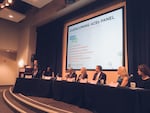
Dave Miller hosts a panel discussion at The Providence Willamette Falls Community Center.
Sage Van Wing / OPB
In 1998, researchers from the CDC and Kaiser-Permanente put out a groundbreaking study. They catalogued a variety of what they called ACEs. It stands for "Adverse Childhood Experiences." ACEs included things like sexual or physical abuse, or living in a home with domestic violence or substance abuse.
The researchers found that the more ACEs someone has, the higher the chance of all kinds of negative health outcomes — from heart disease to cancer to mental illness.
Now the public health community is catching up with this cutting-edge science. Pediatricians, social workers and teachers are asking: Since we know just how damaging childhood traumas are, how do we respond to them? And how can we prevent them in the first place?
We spoke with national expert Nadine Burke Harris, author of "The Deepest Well;" RJ Gillespie, pediatrician at The Children's Clinic; Amy Stoeber, child and adolescent psychologist; Sue Skinner, pediatrician at The Children's Center; Ellen Baltus, social worker in the North Clackamas school district and Fariborz Pakseresht, Director of Oregon's Department of Human Services.
Contact "Think Out Loud"
If you’d like to comment on any of the topics in this show, or suggest a topic of your own, please get in touch with us on Facebook or Twitter, send an email to thinkoutloud@opb.org, or you can leave a voicemail for us at 503-293-1983. The call-in phone number during the noon hour is 888-665-5865.

